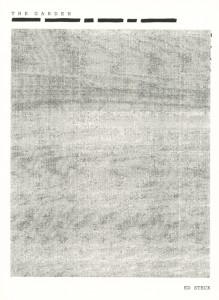Inclusion in Ed Steck’s The Garden
 The Garden
The Garden
by Ed Steck
Ugly Duckling Presse, 2013
104 pages / $14 Buy from UDP
If the Romantic model of the garden is cultivation, then the Post-War model is invasion. Robert Duncan inquires of that famous, primordial garden, “is it dream or memory? homeland of the pleasure principle in the libidinal sea, an island girt round with forbidding walls?”[1] And of ornamentation, William Carlos Williams reminds us “that the bomb also is a flower.”[2] The multiflorous gardens of Ronald Johnson abstract whole histories for admission into their horticultural field. Rampancy, tended by besieged consciousnesses, overruns “the old garden-ground of boyish days.”[3]
The degradation of idealized forms is, of course, a hallmark of post-modernism, but the temptation of placing the world within the garden, or enlarging one’s garden infinitely, enacts a dialogue of control and ownership that becomes problematic for any anti-imperialistic project. Similarly, there is the risk of oversimplification that an artist runs when attempting to account for the volume of media produced around the event of war. Ed Steck’s The Garden: Synthetic Environment for Analysis and Simulation, published by Ugly Duckling Presse, continues the erosion of privileged space begun midcentury with an all-important newness equipped to navigate the bizarre landscape of the 21st.
June 23rd, 2014 / 10:00 am
